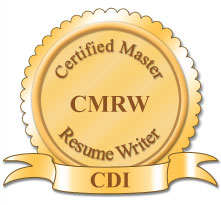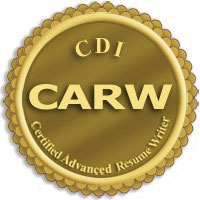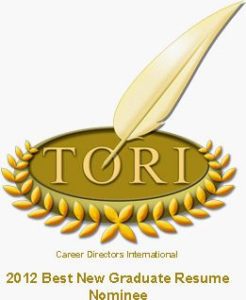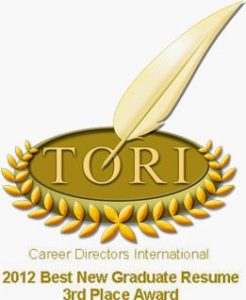
Is your resume’s Education section taking up too much space on your resume? Are you finding it hard to fit in all the information you think is important?
Here are some of your resume Education section questions answered – maybe even questions you didn’t know you had! These tips will help you pack in lots of information without taking up half the space on your resume.
1. Should the Education section come first or last?
If you are a new graduate from college or graduate school, or if you are applying to graduate school, your resume’s Education section generally goes FIRST on your resume (after your header). Why? Because it’s what you’ve done most recently, and/or it is most relevant. (If you are unsure as to what is most relevant in your particular situation, ask an expert for advice.)
If you have been in the working world for 2 years or more, your Experience section will more likely come first, and Education might be last or close to last on your resume.
2. Should I include dates in my Education section?
The answer is, “It depends.”
If you are a new graduate, especially if you’ve graduated from any school within the past five years, then it makes sense to include the date of your graduation or expected graduation.
If you graduated more than 20 years ago, generally it’s recommended not to include the date of your graduation, as you could face age discrimination.
If you are an older job seeker and also got a degree in the past few years, it can help to make you look younger if you put the date of your graduation on your resume.
So consider your specific situation and make a considered judgment call. If you have questions, you might want to consider a resume review by The Essay Expert.
3. What should the basic format be?
- List your educational institutions in reverse chronological order, just as you do with your employment history.
- The most important part of each school section is the name of the school you attended. Put it in bold and/or Small Caps, followed by the city and state. Use the same format you use for your employers.
- Next put the degree you received. If you are anticipating a degree, write “Candidate for B.A,” “B.S. expected,” or “M.A. anticipated.” Fill in the appropriate degree of course.
Here’s an example:

You might like a centered format if your Education section is toward the end of the resume. For example:
4. Do I need a separate line for my GPA and for each of my honors?
If you need to save space, there is no need to put your GPA and honors all on separate lines. You can combine these onto one line, and you can even put them on the same line as your major. How you combine things will depend on how much room you have on other lines. Here are some possibilities:
- BA in Political Science, cum laude, 2016 (GPA: 3.41)
- Bachelor of Arts in Political Science, concentration in Psychology, May 2015
Major GPA: 3.73; Cumulative GPA: 3.683
5. How should I list Honors and Activities?
You do not need an entirely separate section for either Honors or Activities. Only create these separate sections if you need to fill space! Instead, put them under the appropriate school.
Do you have a lot of honors and/or activities? If you need space, you can group them together. For instance, you can have a bullet that says “Honors:” and name your honors, separated by semicolons. Then have a bullet that says “Activities:” and list your activities, separated by semicolons. Not sure how to handle the dates of all these things? Try putting them in parentheses after the honor or activity, and before the semicolon.
Examples:
- Honors: Undergraduate Honors Thesis Research Grant (Honors Program award); Phi Kappa Phi Honor Society; Golden Key International Honour Society
- Honors: Dean’s List (2016-2019); Baylor University Alumni Scholarship (2015-2019); Greek Women’s Leadership Award (2009); Midwest Conference Academic All Conference Team (2018 and 2019)
- Activities: Latino/a Student Association, Secretary (2016-2017), Delegate/Community Service Committee (2015-2017); Mexican Student Organization, Social Chair (2015-2016); South American Student Association, Member (2014-2017)
- Activities: Varsity Women’s Basketball Team, Four Year Letter Winner; Pi Beta Phi Fraternity, Board Director (2016-2017) and Member (2014-2017); University Chapel Choir, Member (2014-2017)
6. Do I need a separate section for Study Abroad?
No! Study abroad is part of your undergraduate education. It can be a bullet, or if you want to emphasize it because of your international interest or language ability, you can bold it. Do not put a space between your undergraduate degree section and the study abroad section, unless you need to fill space.
Example of bullet format:
[end of undergraduate section here]
• Junior-year semester at University of East Anglia, Norwich, England (2015)
Example of bolded section under undergraduate section:
[end of undergraduate section here]
Reid Hall, Columbia University, Paris, France
Summer Study Abroad (Coursework: 19th Century French Painting, French Language)
7. How long should my resume’s Education section be?
Unless you’ve earned five different degrees from five different schools already, your education section generally should take up a maximum of a third of a page. This means it’s important to get Experience to put on your resume and not rely on your Education to get you a job!
Implementing these 6 suggestions will give you a great start on the Education section of your resume, making it both efficient and effective.
Did these tips help you with your resume? Please comment below.












An excellent article that sets it all out so clearly. I’m far beyond the just graduated point but I appreciated your tips none the less.
Ah, one of the problems I WISH I had. Just another of the hazards of a misspent youth. Fortunately experience is providing more background to act as a fill in all the time.
LOL I hope some people are reading for whom this information is applicable! Thank you Diane and Paul for your comments.
Extremely Helpful Article. Thank you Essay Expert!
Paul: Your comment made me really glad that I am working myself to the bone in university. It sure does feel good to encounter the problem of not having enough room to list honors and accomplishments on a resume. Sometimes it feels like I am doing all of this for nothing, but your comment made me really appreciate my hard work! Thanks and good luck on your endeavors!
Aneela